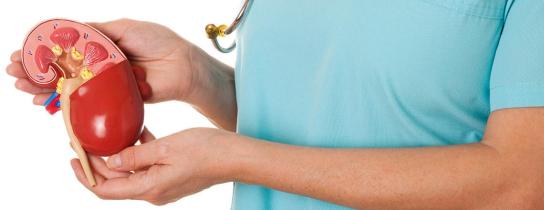
Knowledge is Power in the Fight Against Chronic Kidney Disease
Some diseases often go undetected because symptoms aren’t present until advanced stages. This is true of Chronic Kidney Disease (CKD). Your kidneys are the 2 bean shaped organs located on your back, one on each side of the spine. Their main function is to filter our blood and excrete the poisons/toxins we make on a daily basis out of our body through our urine. Simply put, the kidney maintains the internal environment of the body and when kidneys don’t function properly, there’s a major problem for your whole system.
Chronic Kidney Disease (CKD) refers to long lasting damage of the kidneys which can worsen over time. When CKD reaches an advanced stage, it causes dangerous levels of fluid including waste and electrolytes to build up in our body. If a person reaches this stage of CKD, they will need dialysis or a kidney transplant to live. Experiencing progressive decline of kidney function also increases a person’s risk for heart disease and blood vessel disease. Currently, 30 million people in the U.S. have CKD.
Risk Factors
In the U.S., common causes of CKD are from having Diabetes and Hypertension (high blood pressure). Other risk factors include obesity, being over 60 years old, heart disease, a family history of kidney disease, glomerulonephritis which is inflammation of the glomeruli which are filters in the kidney, and frequent UTIs. In addition, some ethnicities including African Americans, Hispanics, Pacific Islanders, and American Indians also have an increased risk of CKD.
Symptoms
Unfortunately, the development of symptoms in the early stages of the disease is rare; symptoms usually appear when kidney damage is advanced. This means most people are not aware they have kidney disease and do not seek medical attention early on. Symptoms of kidney failure include itching, nausea, vomiting, loss of appetite, fluid retention and swelling, weight loss, changes in urine output, muscle cramps, anemia, bone disease, poor nutritional health, high blood pressure, and nerve damage. These commonly occur when the disease is far advanced.
Treatment
It is possible to treat CKD if it’s caught early which is why early detection and aggressive management of risk factors remains the mainstay of treatment. So if you have a medical condition which increases your risk for CKD, ask your doctor to assess you for CKD or refer you to a nephrologist, a doctor who specializes in treating the kidneys.
The health of the kidney is measured by the presence of protein in the urine as well as the creatinine levels in your blood. Creatinine indicates how much waste is left unfiltered in your blood, which indicates inadequate kidney function. The blood creatinine level is then used to estimate your GFR or glomerular filtration rate, which is the best way to tell how your kidney is functioning.
If you have risk factors, you should check your kidney function by checking your blood pressure, urine protein, and serum creatinine.
Remember the best treatment for CKD is prevention. So you should:
- Monitor other conditions that are risk factors like diabetes, and high blood pressure
- Avoid or limit over the counter medicines and non-steroidal pain medications; consult your doctor when taking these
- Maintain a healthy weight
- Stop smoking
It’s important to have an open dialogue with your physician and to be aware of family history when it comes to chronic kidney disease. Knowing your risk factors can make all the difference in catching this disease in its early stages before dialysis and or a kidney transplant become necessary. Talk with your primary care provider if you have concerns, they’ll refer you to a nephrologist if further examination is needed.
Moyna Kapoor, MD, earned her Medical Degree from Maulana Azad Medical College in Delhi, India. She completed her Residency in Internal Medicine and Fellowship training in Nephrology at Maimonides Medical Center in Brooklyn, NY. Dr. Kapoor is Board Certified in Internal Medicine and Nephrology and is providing care to patients in Newburgh.

 Optum Radiology at Crystal Run Healthcare
Optum Radiology at Crystal Run Healthcare Same and next-day pediatric appointments
Same and next-day pediatric appointments